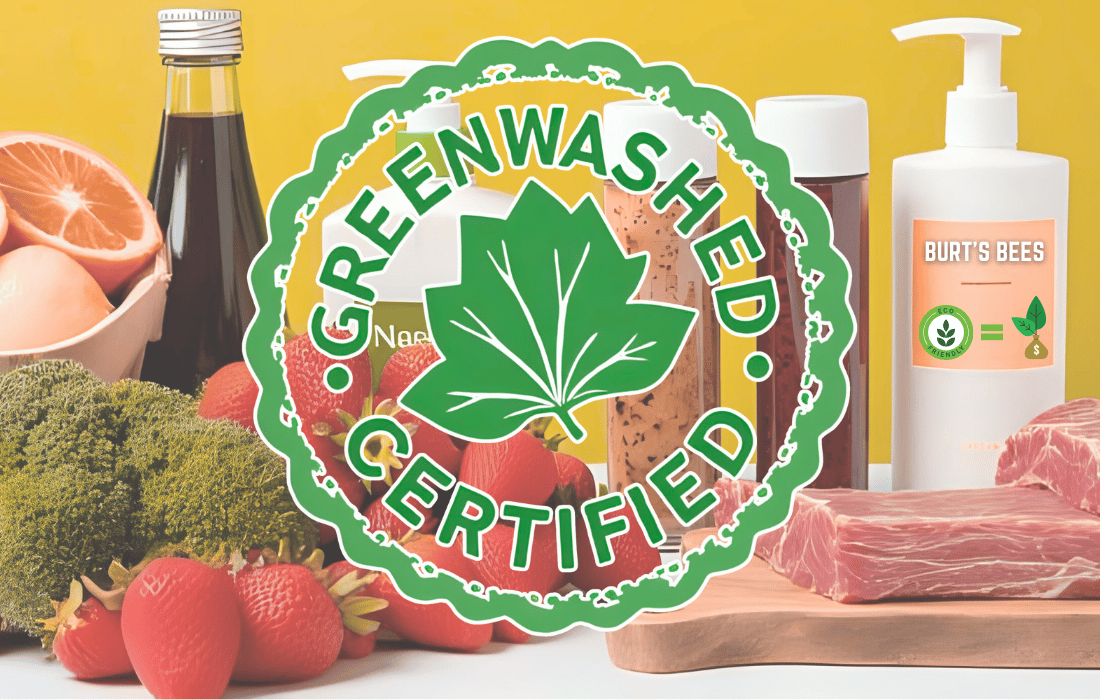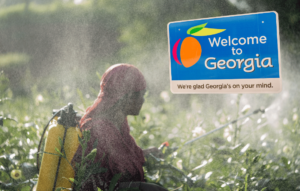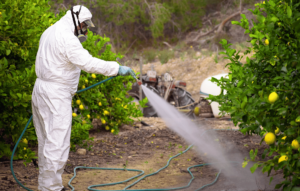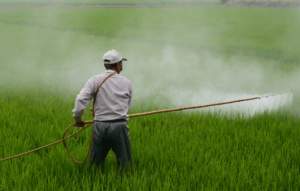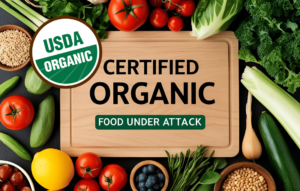We live in an age where “eco-friendly,” “clean,” and “sustainable” are hot-selling words. People are more aware than ever of what goes into their food, their skincare, their clothes—even their cleaning products. But the rise in environmental and health awareness has brought with it an unfortunate side effect: greenwashing.
Greenwashing is when companies make misleading claims about the environmental benefits of a product or practice. It’s a marketing tactic that hijacks good intentions to sell products that might be just as harmful as their conventional counterparts, only with prettier labels and a touch of green ink.
The term “greenwashing” was first coined in the 1980s, but the practice has exploded with today’s booming wellness and sustainability markets. According to the Federal Trade Commission (FTC), companies can’t make misleading environmental claims—but that hasn’t stopped them. Enforcement is weak, oversight is fragmented, and terms like “natural” and “non-toxic” are largely unregulated in the U.S.
Greenwashing on Wall Street: The ESG Deception
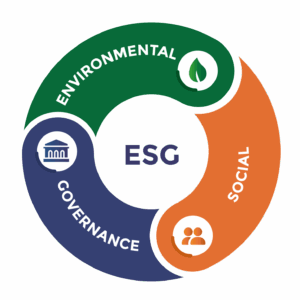
ESG stands for Environmental, Social, and Governance. In theory, ESG funds are supposed to support companies with strong ethical standards and sustainable practices. But in practice? Not so much.
The U.S. Securities and Exchange Commission (SEC) has opened multiple investigations into big-name financial institutions like Goldman Sachs and Deutsche Bank over claims of ESG greenwashing. These funds often include companies like ExxonMobil, one of the world’s largest oil producers, while excluding electric vehicle makers like Tesla due to internal controversies.
Tesla CEO Elon Musk famously tweeted, “ESG is a scam. It has been weaponized by phony social justice warriors.” He wasn’t just being salty. The S&P 500 ESG Index included Exxon but dropped Tesla, raising serious eyebrows about the criteria being used.
ESG as a Control Tool
It’s not just financial deception—it’s about power. ESG is increasingly being used to push a technocratic vision of the future, in which access to capital and resources is tied to compliance with globalist policies. Larry Fink of BlackRock, which manages over $9 trillion in assets, is at the center of this movement, promoting ESG as a way to “reinvent capitalism”.
Critics argue it’s nothing more than a high-tech form of financial gatekeeping—rewarding the “woke” companies with capital while punishing others, regardless of actual emissions or environmental impact.
The Dirty Truth About Carbon Farming
Sounds Good in Theory…
Carbon farming is another trendy buzzword. The idea is to sequester carbon in soil through regenerative practices like no-till farming, cover crops, and agroforestry. It’s being pushed by everyone from Bill Gates to PepsiCo.
In practice, carbon farming is being co-opted by agrochemical giants like Bayer, Cargill, and Syngenta. These corporations offer farmers financial incentives to join their carbon programs—only if they use their patented seeds, chemical fertilizers, and digital farming platforms.
…But Questionable in Reality
Friends of the Earth recently exposed the greenwashing behind regenerative agriculture practices that still rely heavily on glyphosate, synthetic fertilizers, and GMOs. Bayer’s Carbon Program, for example, encourages farmers to adopt “regenerative” practices while continuing to use Roundup, a pesticide linked to cancer and environmental damage.
Not only do these practices undermine soil health, but they also place small farmers in digital bondage. Companies like Indigo Ag and the Regen Network collect massive amounts of farm data under the guise of sustainability—data that could be used to manipulate markets and control access to land.
Consumer Products and the Green Packaging Lie
Brands are banking on your eco-conscious instincts from the beauty aisle to the cleaning section. But don’t be fooled—just because something wears a green label doesn’t mean it’s good for you or the planet.
It’s not just Wall Street and Big Ag. Your local grocery store is packed with deceptive green labels. Everything from shampoo to dishwasher pods is marketed as “clean,” “non-toxic,” or “natural”—terms that mean very little without regulation.
As the Environmental Working Group (EWG) points out, a product can be labeled “natural” even if only 5% of the ingredients are actually derived from nature. And terms like “non-toxic” are so vague they’re essentially meaningless without third-party verification.
Personal Care, Cleaning Products, and the Color Green
Below are a few notable examples of once-trusted “natural” or “clean” brands that were later acquired by large corporations, often with changes in ingredient transparency or product formulation, sometimes without the consumer even realizing:
Burt’s Bees – Acquired by Clorox in 2007. While the branding stayed earthy and rustic, some customers noted changes in ingredient quality and questioned Clorox’s commitment to truly natural products.
Tom’s of Maine – Bought by Colgate-Palmolive in 2006. Despite its original reputation for using simple, safe ingredients, many products now contain questionable preservatives and synthetics.
Seventh Generation – Purchased by Unilever in 2016. Critics argue that the brand’s original mission has been diluted, and not all products are as eco-conscious as the branding implies.
The Honest Company – Though not acquired, it has faced multiple lawsuits for mislabeling products and falsely advertising ingredients as “natural” or “non-toxic”.
Native Deodorant – Acquired by Procter & Gamble in 2017. After the acquisition, the formula and scent options were expanded, but ingredient purists began raising questions.
Schmidt’s Naturals – Purchased by Unilever in 2017. Consumers raised concerns about formulation changes and the introduction of ingredients like baking soda, which can be irritating to some.
These examples show how easily a “natural” reputation can be leveraged, monetized, and morphed—sometimes quietly—by corporate owners seeking to ride the green wave without maintaining the original mission or quality.
The Whole Foods Example
Even trusted retailers like Whole Foods aren’t immune. The company recently came under fire for selling genetically modified (GMO) sweet corn—developed by Monsanto/Bayer—under the USDA’s “bioengineered” label. Critics argue that this undermines the store’s long-standing commitment to organic, non-GMO foods.
As Errol Schweizer, a former Whole Foods exec, put it: “What happened to the Whole Foods non-GMO promise?”
The Weaponization of Certification Labels
Greenwashing thrives in the gray areas of certification. While the FTC’s Green Guides provide some standards, many certifications—like “reef safe”, “eco-friendly”, or even “sustainable”—are either self-issued or backed by questionable science.
Even the USDA Organic label has its flaws, but it remains one of the few certifications with strict oversight. Other labels can easily be bought or manipulated.
Carbon farming programs run by Bayer and Cargill let corporations buy carbon credits without actually reducing emissions. Meanwhile, farmers bear the cost of compliance, with expensive soil testing, data monitoring, and yield reductions.
The Regulatory Mess: Why Greenwashing Persists
Multiple U.S. agencies share responsibility for environmental claims—FDA, EPA, FTC, CPSC—but coordination is poor. This fragmented oversight often leads to regulatory gaps that allow companies to get away with misleading or outright false claims about sustainability. Enforcement is rare and reactive, not proactive.
This allows corporations to stretch definitions, create their own standards, or hide behind vague language. For example, while the FTC Green Guides offer some direction, they haven’t been updated in years and lack the teeth needed for meaningful action.
Compare that to the European Union, which recently enacted a ban on generic environmental claims unless backed by official certification. The EU’s stricter regulatory stance forces brands to prove their environmental benefits through third-party audits and scientific documentation—a sharp contrast to the U.S.’s hands-off approach.
Some U.S. states, like California and New York, are taking matters into their own hands by enforcing transparency laws and false advertising crackdowns. But unless federal agencies work in tandem with stronger legislation, greenwashing will continue to thrive under the radar, dressed in buzzwords and fake virtue.
Independent Brands That Refuse to Sell Out
While many once-authentic companies have compromised their values for corporate buyouts, a few small brands continue to stand firm in their commitment to ingredient integrity, consumer transparency, and mission-driven business.
VanMan
VanMan offers a line of personal care products rooted in ancestral wisdom and modern simplicity. Each product is designed to minimize toxic exposure while supporting natural health.

Save 10% on your first order with VanMan with code “VANMANDISC” Miracle Tooth Powder – Fluoride-free, mineral-rich formula for remineralizing teeth
Peppermint Aloe Mouth Rinse – Freshens breath and supports gum health without synthetic ingredients
Coconut Magnesium Deodorant – Aluminum-free and free of synthetic fragrance
No Bugs Bug Balm – A tallow-based natural insect repellent balm made with essential oils like cedarwood and citronella to protect against bugs without synthetic chemicals
Peppermint Beeswax Lip Balm – Made with organic beeswax, coconut oil, almond oil, lanolin, and essential oils of peppermint and rosemary for refreshing and hydrating lip care.
Whipped Body Butter – Moisturizes and repairs dry skin naturally.
Pulling Oils – A simple blend of organic extra virgin coconut oil and peppermint oil, designed for oil pulling to gently cleanse teeth and gums, supporting oral freshness and comfort.
Tallow & Honey Soap – Crafted from 100% grass-fed beef tallow, organic raw honey, and vanilla oil, this soap offers a luxurious lather and natural vanilla scent, free from synthetic additives.
- Protection Oils Hair Serum – A powerful, fragrance-free hair serum combining coconut, castor, almond, olive, jojoba, and emu oils to strengthen and moisturize hair; also effective as an all-over body moisturizer.
VanMan has vowed to remain independent and never compromise on quality or integrity.
Marrow & Tallow
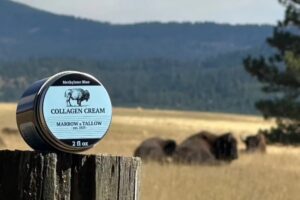
Marrow & Tallow specializes in small-batch skincare that blends traditional animal fats with modern science, focusing on deep nourishment and skin regeneration.
Methylene Blue Collagen Cream – Combines tallow with antioxidants to restore skin elasticity
Sun Balm – Non-nano zinc oxide and tallow-based SPF that nourishes while protecting
Tallow Face & Body Creams – Rich in fat-soluble vitamins for intensive hydration
All ingredients are sourced from grass-fed, regenerative farms, and no synthetic preservatives or emulsifiers are used.
Branch Basics
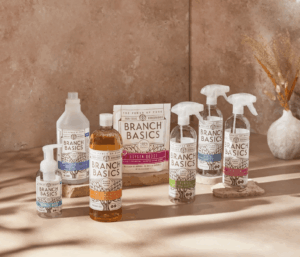 Branch Basics is leading the way in non-toxic cleaning with a simple, powerful solution that works throughout the home without harmful chemicals.
Branch Basics is leading the way in non-toxic cleaning with a simple, powerful solution that works throughout the home without harmful chemicals.
The Concentrate – A single plant- and mineral-based solution for all-purpose, laundry, and bathroom cleaning
Oxygen Boost – Adds power to laundry and stain removal without bleach
Refillable Bottles – Reduces plastic waste with a minimal, elegant system
They back every product with ingredient transparency and a clear commitment to human health. Branch Basics has made it simple for our household to have an all-in-one supply of hand soap, dishwasher and laundry detergent, cleaning spray, and more.
PlantPaper
 PlantPaper reimagines toilet paper by eliminating bleach, formaldehyde, and synthetic fragrances from a product we use every day.
PlantPaper reimagines toilet paper by eliminating bleach, formaldehyde, and synthetic fragrances from a product we use every day.
Bamboo-Based Rolls – Soft, strong, and sustainable alternative to tree pulp
Zero Toxins – No chlorine, bleach, or harmful dyes
Plastic-Free Packaging – Designed with environmental impact in mind
PlantPaper proves that even the most overlooked daily products can be redesigned for health and sustainability.
These brands serve as a reminder that real integrity exists, just not always in the biggest aisle at the store.
How to Protect Yourself from Greenwashing
Dodging greenwashing isn’t just about being savvy—it’s about being skeptical, curious, and a bit relentless. The good news? There are real tools and smart strategies to help you cut through the noise and find products that truly walk the talk.
Read Beyond the Buzzwords
“All natural” doesn’t mean non-toxic
“Non-toxic” is subjective and unregulated
“Green” or “eco-friendly” often refers only to packaging, not contents
“Sustainable” could apply to just one part of a product’s life cycle
Use Trusted Tools
The EWG’s Skin Deep and Healthy Living apps offer verified product info
Look for EWG Verified, Certified Regenerative, Regenerative Organic Certified, or USDA Organic Certified (it may be a broken system, but better than non-organic still) over generic green labels
Avoid “fragrance” or “parfum” on ingredient lists—they’re often cover words for toxic chemicals
Ask Questions and Support Transparency
Check company websites for detailed ingredient breakdowns
- Search to see if the company is founder-owned, or if it has been sold out to a larger mega-corp
Favor brands that list every ingredient and back up claims with science
Avoid products that rely on vague terms without context or evidence
Final Thoughts: The Illusion of Progress
Greenwashing isn’t just a marketing gimmick—it’s a powerful tool to maintain the status quo. It gives corporations the appearance of progress while continuing harmful practices behind the scenes.
In a world where buzzwords like “clean”, “regenerative”, and “sustainable” dominate, consumers must become skeptics. Ask who benefits. Follow the money. And remember: just because it has a leaf on the label doesn’t mean it’s good for you—or the planet.
Let’s not confuse branding for integrity. Real environmental change isn’t found on a bottle—it’s found in honesty, accountability, and actions that actually protect people and the planet.

